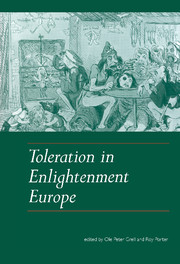Book contents
- Frontmatter
- Contents
- List of contributors
- Preface
- 1 Toleration in Enlightenment Europe
- 2 Toleration and the Enlightenment Movement
- 3 Multiculturalism and Ethnic Cleansing in the Enlightenment
- 4 Intolerance, the Virtue of Princes and Radicals
- 5 Spinoza, Locke and the Enlightenment Battle for Toleration
- 6 Toleration and Enlightenment in the Dutch Republic
- 7 Toleration and Citizenship in Enlightenment England: John Toland and the Naturalization of the Jews, 1714–1753
- 8 Citizenship and Religious Toleration in France
- 9 A Tolerant Society? Religious Toleration in the Holy Roman Empire, 1648–1806
- 10 Enlightenment in the Habsburg Monarchy: History of a Belated and Short-Lived Phenomenon
- 11 Toleration in Eastern Europe: the Dissident Question in Eighteenth-Century Poland–Lithuania
- 12 Toleration in Enlightenment Italy
- 13 Inquisition, Tolerance and Liberty in Eighteenth-Century Spain
- Index
7 - Toleration and Citizenship in Enlightenment England: John Toland and the Naturalization of the Jews, 1714–1753
Published online by Cambridge University Press: 03 February 2010
- Frontmatter
- Contents
- List of contributors
- Preface
- 1 Toleration in Enlightenment Europe
- 2 Toleration and the Enlightenment Movement
- 3 Multiculturalism and Ethnic Cleansing in the Enlightenment
- 4 Intolerance, the Virtue of Princes and Radicals
- 5 Spinoza, Locke and the Enlightenment Battle for Toleration
- 6 Toleration and Enlightenment in the Dutch Republic
- 7 Toleration and Citizenship in Enlightenment England: John Toland and the Naturalization of the Jews, 1714–1753
- 8 Citizenship and Religious Toleration in France
- 9 A Tolerant Society? Religious Toleration in the Holy Roman Empire, 1648–1806
- 10 Enlightenment in the Habsburg Monarchy: History of a Belated and Short-Lived Phenomenon
- 11 Toleration in Eastern Europe: the Dissident Question in Eighteenth-Century Poland–Lithuania
- 12 Toleration in Enlightenment Italy
- 13 Inquisition, Tolerance and Liberty in Eighteenth-Century Spain
- Index
Summary
In the early summer of 1689, after much parliamentary wrangling and debate, the statute of 1 William and Mary Caput 18 ‘An Act for exempting their Majesties protestant Subjects, dissenting from the Church of England, from the penalties of certain laws’ took away many of the legal restraints against religious conscience. Commonly called the ‘Toleration Act’, the statutory reform amounted to little more than the repeal of penalties against Protestant dissidents like Quakers, Baptists and other varieties of sectarian who refused to conform to ritual, ceremonial or doctrinal elements within the Anglican constitution. The passage of the Act has very often been linked with the intellectual defence of the liberty of conscience articulated famously by John Locke in his first, and subsequent, letters Concerning Toleration (1689). That there was a gap between Locke's radical defence of the rights of Christian conscience, and the mere taking away of certain penalties against religious worship, was clear to the man himself. As he wrote, in June 1689, to Phillip van Limborch in the Low Countries,
Toleration has now at last been established by law in our country. Not perhaps so wide in scope as might be wished for by you and those like you, who are true Christians and free from ambition and envy. Still it is something to have progressed so far. I hope that, with these beginnings, the foundations have been laid of that liberty and peace in which the Church of Christ is one day to be established.
- Type
- Chapter
- Information
- Toleration in Enlightenment Europe , pp. 133 - 156Publisher: Cambridge University PressPrint publication year: 1999
- 5
- Cited by

